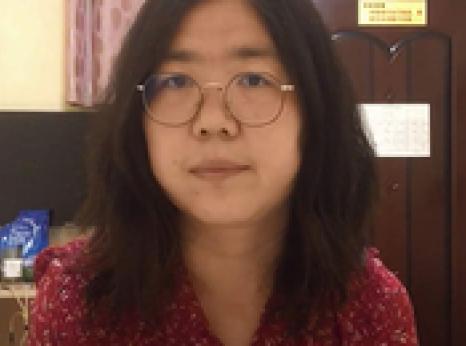China: Covid-19 Journalist Still Needs Medical Attention

Zhang Zhan, a former lawyer, is a citizen journalist who has actively spoken out about politics and human rights issues in China. In February 2020, she travelled to Wuhan, then the centre of the Covid-19 outbreaks in China. She used online platforms (including WeChat, Twitter and YouTube) to report on the detention of other independent reporters as well as the harassment of the victims’ families who were seeking investigations and accountability for events in Wuhan. Zhang Zhan went missing on 14 May 2020? in Wuhan and was subsequently revealed to have been detained by police in Shanghai, more than 640 km away.
Zhang Zhan was able to have a video call with her family on 14 October 2021 for four minutes and nine seconds. The mandated duration of the call is supposed to be five minutes. Her family said she looked incredibly thin and was determined to continue her partial hunger strike, and that they did not expect her to live through the winter if she was not released on medical grounds. Zhang Zhan was again able to speak to her family through another video call on 29 October 2021. They shared that her condition had further worsened, and she had no energy to walk nor raise her head. A further concern was the yellow colour of her skin, a sign of a potential life-threatening condition.
Worried about Zhang Zhan, her family submitted a medical bail application for her on 15 November to Shanghai’s Women’s Prison and have not received a response yet. The application was submitted pursuant to the criteria listed in the “Notice of the Supreme People's Court, the Supreme People's Procuratorate, the Ministry of Public Security, and Other Ministries on Issuing the Provisions on Temporary Service of Sentences Outside Prisons”, (最高人民法院、最高人民检察院、公安部等关于印发《暂予监外执行规定》的通知) through which a prisoner can apply for medical bail when he/she is facing a critical health condition.
Since the news that Zhang Zhan’s health was in critical condition, many organisations and states have spoken up and called on the Chinese authorities to release Zhang Zhan. This includes the EU and the US. Amnesty International also joined Reporters Without Borders (RSF) in a statement to urge China to release Zhang Zhan in September 2021. Zhang Zhan is one of the cases of the Write for Rights 2021 and featured in the Free the Five Campaign.
Zhang Zhan started a hunger strike in June 2020 to protest her detention and assert her innocence. Despite her intention to continue with her protest, detention centre authorities reportedly began forcibly feeding her through a feeding tube, and it was reported that her cellmates were also involved in the act of forcibly feeding her. In December 2020, Zhang’s defence lawyer said she was physically very weak and suffering from stomach pain, dizziness and weakness while walking. It was also reported that Zhang Zhan was forced to wear shackles and that her hands were restrained 24 hours a day for more than three months as punishment for her hunger strike.
Citizen journalists were the primary, if not the only, source of uncensored and first-hand information about the Covid-19 outbreak in China. There are not many citizen journalists in China, as they are not able to obtain official accreditation and face consistent harassment and repression for reporting news and disseminating information that is censored by the government.
There have been many reports of independent journalists and activists harassed by authorities for sharing information about Covid-19 on social media. These include outspoken lawyer and citizen journalist Chen Qiushi, who reported being harassed by the authorities after posting footage from hospitals in Wuhan, and Wuhan resident Fang Bin, who was taken by the authorities and is now believed to be detained in Wuhan after posting a video purporting to show corpses of COVID-19 victims.
The crime of “picking quarrels and provoking trouble” (寻衅滋事罪) under Article 293 of the Chinese Criminal Law is a broadly defined and vaguely worded offence that has been widely used to target activists and human rights defenders. Although the crime originally applied to acts that disrupted order in public places, the scope has expanded since 2013 to include online spaces as well. Anyone convicted could face a maximum of five years in prison.